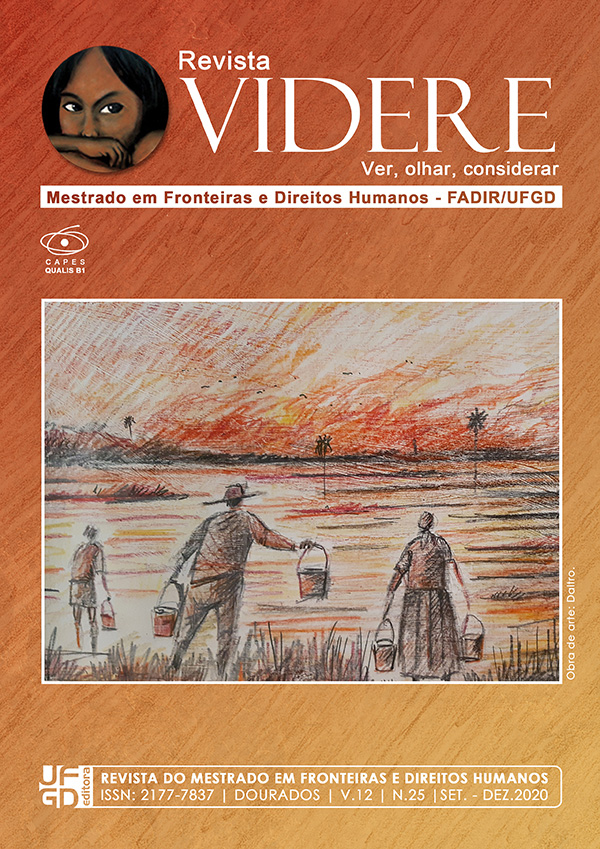Critical analysis of the minimum requirements for urban land plots and the possibilities of flexibilization within the scope of land regularization
DOI:
https://doi.org/10.30612/videre.v12i25.11619Keywords:
Urban plot. Housing Law. land tenure regularization.Abstract
The present article seeks to analyze the legal situation of urban requirements for the regularity of a plot of urban land, considering the minimum conditions for a house to be considered worthy, and as a way of guiding public land regularization policies. In this way, it is questioned how the flexibilization of these requirements should take place, which was provided by law for the purpose of facilitating real estate legalization, without compromising the well-being of the inhabitants. Through the dialectical hermeneutic method, the objective is to clarify, without the intent of exhausting the topic, the scope of the forecasts used in the legislation in comparison with the dictates of housing. This brief research space concludes that the a priori list of urban improvements is not possible, leaving the urban inspection entities to instrumentalize techniques for the correct determination, in each social case, of the needs of the urban area that is being regularized.Downloads
References
CARVALHO FILHO, José dos Santos. Comentários ao estatuto da cidade. 5 ed. ver. ampl. e atual. São Paulo: Atlas, 2013.
FARIAS, Cristiano Chaves de e ROSENVALD, Nelson. Curso de Direito Civil Vol. 5 direitos reais. 10 ed. rev. atual. e ampl. Salvador: Juspodivm, 2014.
LEAL, Rogério Gesta. Estado, administração pública e sociedade novos paradigmas. Porto Alegre: Livraria do advogado, 2006.
LEFEBVRE, Henri. O direito à cidade. São Paulo: Centauro, 2011.
NALINI, José Renato; LEVY, Wilson. Regularização fundiária. 2. ed. rev. atual. e ampl. Rio de Janeiro: Forense, 2014.
SARLET, Ingo Wolfgang. A eficácia dos direitos fundamentais: uma teoria geral dos direitos fundamentais na perspectiva constitucional. 12 ed. rev. atual. e ampl. Porto Alegre: Livraria do Advogado, 2015.
SARLET, Ingo Wolfgang. Comentário ao artigo 6º. In: CANOTILHO, J. J. Gomes; MENDES, Gilmar F.; STRECK, Lênio L.; ________ (Coords.). Comentários à Constituição do Brasil. São Paulo: Saraiva/Almedina, 2013.
SILVA, José Afonso da. Curso de Direito Constitucional Positivo. 6 ed. rev. e atual. São Paulo: Malheiros Editores, 2013.
SOTO, Hernando de. The mystery of capital: why capitalism triumphs in the West and fails everywhere eles. New York: Basic Books, 2000.
Downloads
Published
How to Cite
Issue
Section
License
Authors must accept the publication rules when submitting the journal, as well as agree to the following terms:
(a) The Editorial Board reserves the right to make changes to the Portuguese language in the originals to maintain the cultured standard of the language, while respecting the style of the authors.
(b) Authors retain the copyright and grant the journal the right to first publication, with the work simultaneously licensed under the Attribution-NonCommercial-ShareAlike 3.0 Brazil (CC BY-NC-SA 3.0 BR) that allows: Share - copy and redistribute the material in any medium or format and Adapt - remix, transform, and create from the material. CC BY-NC-SA 3.0 BR considers the following terms:
- Attribution - You must give the appropriate credit, provide a link to the license and indicate whether changes have been made. You must do so under any reasonable circumstances, but in no way that would suggest that the licensor supports you or your use.
- NonCommercial - You may not use the material for commercial purposes.
- Sharing - If you remix, transform, or create from material, you must distribute your contributions under the same license as the original.
- No additional restrictions - You may not apply legal terms or technological measures that legally restrict others from doing anything that the license permits.
(c) After publication, authors are allowed and encouraged to publish and distribute their work online - in institutional repositories, personal page, social network or other scientific dissemination sites, as long as the publication is not for commercial purposes.



















